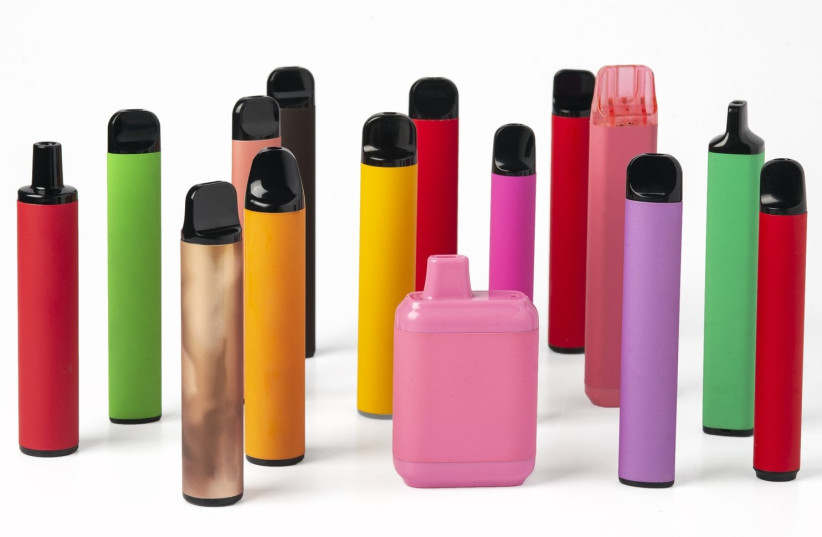Major progress could be made in fighting the vaping epidemic among teens and young adults – which is ubiquitous in Israel – if there was a complete restriction on sweet flavorings and cooling agents in both cartridge and disposable e-cigarette devices.
So say researchers from the Center for Tobacco Research at Ohio State University’s Comprehensive Cancer Center. The current US Food and Drug Administration (FDA) flavor ban applies only to cartridge e-cigarette devices.
A new study published in the Journal of Studies on Addiction and Drugs under the title “Adolescent and Young Adult Response to Hypothetical E-Liquid Flavor Restrictions” suggests that sweet flavorings and cooling agents like menthol keep youth puffing e-cigarettes, and the majority indicate they would likely stop vaping if e-liquid flavors were limited to tobacco-flavor only.
In Israel, there is a law that limits only the amount of nicotine in e-cigs but no restriction on menthol on flavors in vaping products or of nicotine or flavors in regular cigarettes, commented attorney Amos Hausner, head of the Israel Society for the Prevention of Smoking. in regular cigarettes and e-cigs. “The companies prefer to add menthol and other flavors to their products because they cover up the horrible, bitter taste of nicotine.”
Rates of e-cigarette use among young adults and adolescents remain high in the US, despite federal restrictions that limit the availability and appeal to youth. This new study sought to examine how restricting flavors could affect adolescent and young adult e-cigarette usage.

The Ohio researchers surveyed 1,414 teens between the ages of 14 and 17 about their e-cig use and behaviors. This included demographic and self-reported information about the type of device used, usage habits, preferred flavors and intent to discontinue use of the vaping device in response to proposed hypothetical comprehensive flavor ban.
Overall, 39% of respondents said they would stop using their e-cigs if tobacco and menthol-flavored e-liquids were the only options available, and nearly 71% would quit vaping under a tobacco-only product standard.
“Our data add to an expanding body of evidence showing that youth have a preference for sweet flavorings that make vaping easier for novice users of e-cigarette products, priming them for a potential lifetime of dependency to nicotine,” said pediatric psychologist Prof. Alayna Tackett, a senior author of the study at the university. The researchers asserted that taking a closer look at how flavorings impact usage behaviors in youth and adult populations is urgent.
Necessary restrictions placed on nicotine pods
In February 2020, the FDA put restrictions on flavorings for cartridge/pod e-cig devices, but the ban did not extend to disposable devices or to menthol flavoring for all devices. Sales of e-cig cartridge products went down, but disposable devices and menthol-flavored pod/cartridge devices went up.
In April of last year, the FDA issued proposed product standards banning menthol flavoring in cigarettes and cigars, but the benefits of these product standards could be weakened by the role of substitute products still available in the market.
Tackett noted that adolescents and young adults using flavors with cooling additives such as fruit ice reported higher odds of discontinuing use under a tobacco-only product standard compared with users who preferred menthol flavor only, indicating an important distinction between these groups. Fruit ice refers to e-cig flavors that have a fruit base providing flavor with a cooling additive such as menthol or a synthetic cooling agent.
“In this sample of adolescents and young adults, it appears that non-tobacco flavors may be important for their interest in and continued use of e-cigs,” she said.
Cigarette smoking remains the leading cause of preventable death in the US, as well as in Israel. Tackett says preventing use of e-cigarettes among young people is a crucial goal for public health, but she also pointed to the potential impact of e-cig regulation on adults who smoke and have begun using e-cigarettes as an alternative to quitting altogether.
“Many adults prefer using non-tobacco flavors to switch from combustible cigarettes to e-cigarettes,” Tackett concluded. “Flavor-restriction policies should include the best ways to protect public health while supporting adults who are interested in choosing potentially less harmful alternatives to combustible cigarettes.”
